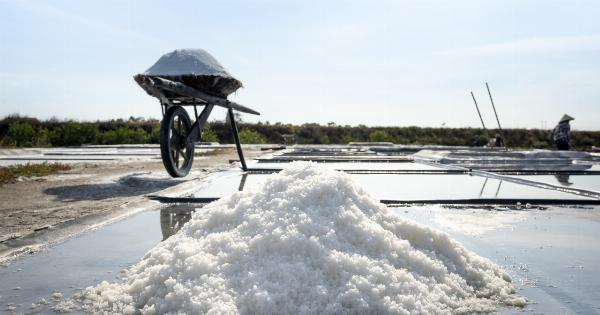As people age, it becomes increasingly important for them to maintain a healthy diet and lifestyle. One crucial aspect of a healthy diet is the consumption of salt.
While salt is an essential mineral for the human body, excessive intake can be detrimental, especially for senior citizens. It is vital to understand the risks associated with high salt intake and the ways in which it can be reduced. By making conscious choices and adopting healthier alternatives, older adults can safeguard their well-being and enjoy a fulfilling life.
The Dangers of High Salt Intake for Seniors
Sodium, the primary component of salt, is essential for maintaining various bodily functions, including fluid balance, nerve transmission, and muscle contraction.
However, an excessive salt intake can significantly impact the health of senior citizens, leading to various health issues:.
Hypertension and Cardiovascular Disease
High salt intake is closely linked to the development of hypertension, also known as high blood pressure, a condition prevalent among elderly individuals.
Hypertension puts excessive strain on the heart, increasing the risk of cardiovascular diseases, such as heart attacks and strokes. Reduced salt consumption can help prevent or mitigate these risks.
Water Retention and Edema
Sodium has the ability to attract and retain water in the body, leading to water retention, also known as edema. This condition is particularly prevalent among seniors and can cause swelling in the extremities, such as the legs, ankles, and feet.
By reducing salt intake, the risk of water retention and related discomfort can be minimized.
Osteoporosis and Calcium Imbalance
Excessive salt intake can adversely affect calcium balance in the body, leading to increased calcium excretion through urine. This can accelerate the development of osteoporosis, a condition characterized by weak and brittle bones.
Senior citizens, who are already prone to osteoporosis due to age-related factors, should limit their salt intake to maintain healthy bone density.
Reducing Salt Intake for Senior Citizens
Now that we understand the risks associated with high salt intake among senior citizens, it is essential to explore strategies for reducing salt consumption without compromising the taste and pleasure of food. Here are some practical tips:.
Read Food Labels
When grocery shopping, make it a habit to read food labels carefully. Look for the sodium content mentioned on the labels. Opt for products that are low in sodium or have reduced salt alternatives.
Season with Herbs and Spices
To enhance the flavor of meals, rely on a variety of herbs and spices instead of reaching for the salt shaker. Experiment with different combinations to discover new and exciting tastes.
Use Citrus Juices and Vinegar
Lemon or lime juice and vinegar can provide a tangy flavor to your dishes without the need for excessive salt. Additionally, these acids can enhance the overall palatability of the food.
Cook from Scratch
Prepackaged and processed foods often contain high levels of sodium. By cooking meals from scratch using fresh ingredients, you have better control over the amount of salt added.
Avoid Salty Snacks
Common snacks like chips, pretzels, and salted nuts are often high in salt content. Opt for healthier alternatives such as unsalted nuts, fresh fruits, or homemade snacks.
Encourage Proper Hydration
Drinking an adequate amount of water is essential for maintaining overall health and flushing excess sodium from the body. Encourage senior citizens to stay hydrated throughout the day to support the reduction of salt intake.
Consult a Healthcare Professional
If you’re unsure about modifying your diet or have specific health concerns, consider consulting a healthcare professional or a registered dietitian.
They can provide personalized guidance and recommendations based on your individual needs and medical history.
Conclusion
Reducing salt intake is crucial for senior citizens to maintain their health and well-being.
By understanding the risks associated with high salt intake and making conscious choices in their diet, seniors can significantly reduce their risk of developing hypertension, cardiovascular diseases, water retention, osteoporosis, and other salt-related health issues. Encouraging a low-salt diet and adopting healthier alternatives will help seniors live a more fulfilling and healthy life.





























